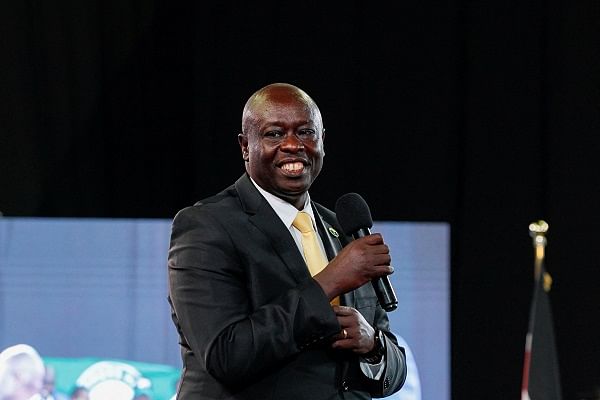Nairobi [Kenya], July 5 (ANI/Xinhua): Kenya’s campaign for the presidency has entered a decisive moment ahead of the country’s general elections slated for August 9, with each of the four candidates outlining bold, ambitious albeit controversial blueprints to win the hearts and minds of 22.1 million registered voters.
For the first time in the country’s history of multiparty politics dating back three decades ago, the presidential candidates have focused primarily on the economic plight of citizens, saddled by inflationary pressure and unemployment.
So far, three out of the four presidential candidates have launched their manifesto, outlining their key priorities including economic renewal, anti-graft war, youth and women empowerment if elected to the highest office in the land.
Raila Odinga, the 77-year-old veteran opposition leader who is vying for presidency under the Azimio La Umoja (Resolution for Unity) One Kenya Coalition of 26 political parties, was the first to launch his manifesto on June 6, with a firm pledge to unite the country, hasten economic growth, improve governance and revamp provision of basic services like education, health, water, and shelter.
With backing from Kenyan President Uhuru Kenyatta and a large section of the country’s economic and political elite, Odinga who is making his fifth stab at the presidency has a clear advantage in the race.
Odinga’s manifesto that outlined his ten-point agenda for the country set the tone for the presidential campaigns, amid pledges for drastic reforms in the country’s economic and governance structures, to realize inclusive growth.
Some of the ambitious pledges Odinga made in his manifesto was that his administration would ensure that poor households received a monthly stipend of 6,000 shillings (about 50.90 U.S. dollars) besides rolling out universal health insurance and free schooling up to the tertiary level.
Determined to maintain an edge in the presidential race, Odinga’s three rivals have also been traversing the country, making a strong pitch for economic empowerment in a bid to win more voters.
Local pollsters have placed Odinga neck to neck with his closest rival William Ruto, the 56-year-old sitting deputy president who is eyeing the presidency under the Kenya Kwanza (Kenya First) alliance of more than ten political parties.
When he launched his manifesto last Thursday night, Ruto stressed that his grassroots-centered economic model would channel more resources to small and medium-sized enterprises, agro-processing, and indigenous manufacturing, to spur growth and tackle youth unemployment.
Pundits noted that while Ruto and Odinga were fierce competitors in the race for the presidency, their point of convergence was the urgency to address the soaring cost of living and unemployment, which threatened Kenya’s stability.
The two candidates have divergent views on how to reinvigorate economic growth, fight graft, and govern the country effectively, but are united in their call for people-centered growth, gender equity, and universal access to basic services.
Both Ruto and Odinga represent mainstream political formations and have avoided taking controversial positions unlike their nearest competitor, George Wajackoyah, a legal scholar who has caused a sensation on the campaign trail, for pledging to legalize marijuana cultivation.
When he launched his manifesto last Thursday night, the 63-year-old Wajackoyah who is vying for presidency under the Roots Party vowed to make marijuana a cash crop besides encouraging farmers to rear snakes, to boost Kenya’s export earnings.
According to Wajackoyah, large-scale cultivation and export of medical marijuana could fetch 78.03 billion dollars to the Kenyan economy annually, while each local farmer would make 6,300 dollars from the sale of a vial of cobra snake’s venom.
His controversial proposals like relocating the capital Nairobi to Isiolo, a semi-arid county in northern Kenya, suspending sections of the constitution, and allowing Kenyans to work for only four days a week, veered to the extreme.
Analysts opine that Wajackoyah could deny Ruto and Odinga a sizable chunk of youthful voters who are animated by his comical and sometimes controversial policy prescriptions, even as he unsettles the status quo.
David Mwaure Waihiga, a veteran political activist who is eyeing the presidency under the Agano party and is yet to launch his manifesto, has been promising ethical leadership while eschewing controversial positions. (ANI/Xinhua)
This report is auto-generated from ANI news service. ThePrint holds no responsibility for its content.



